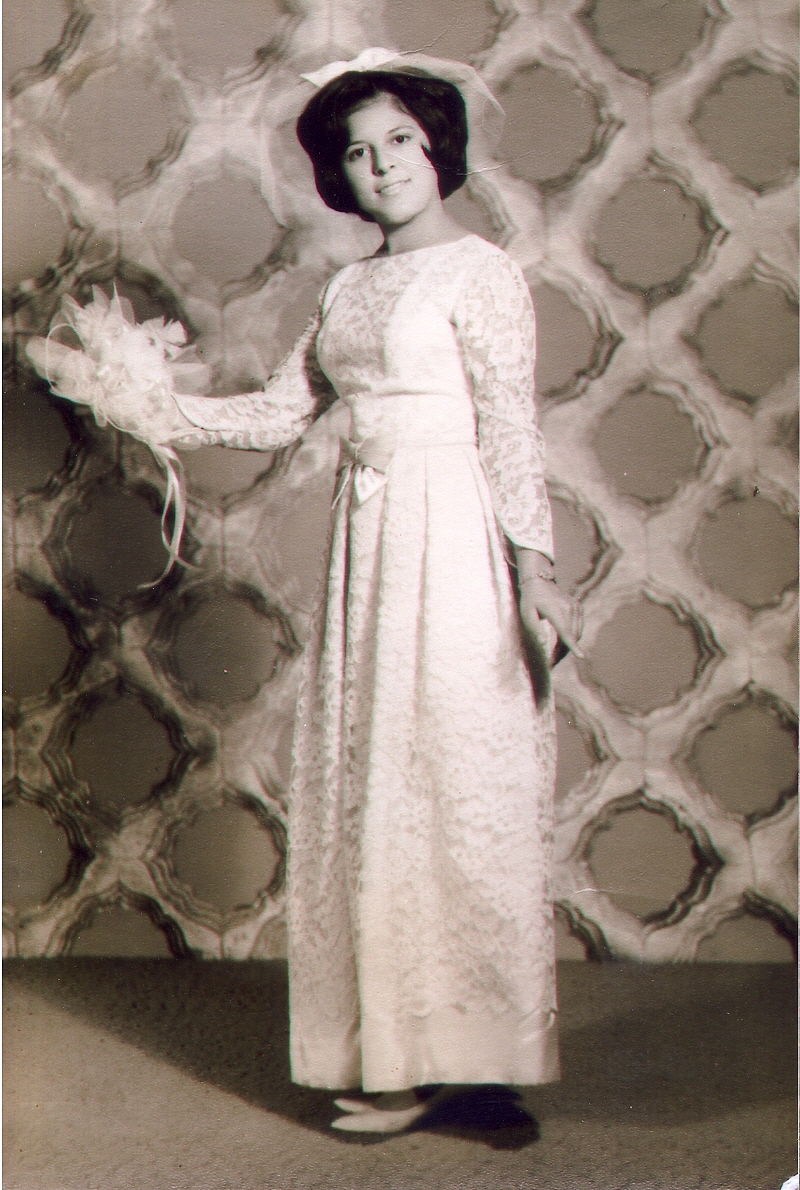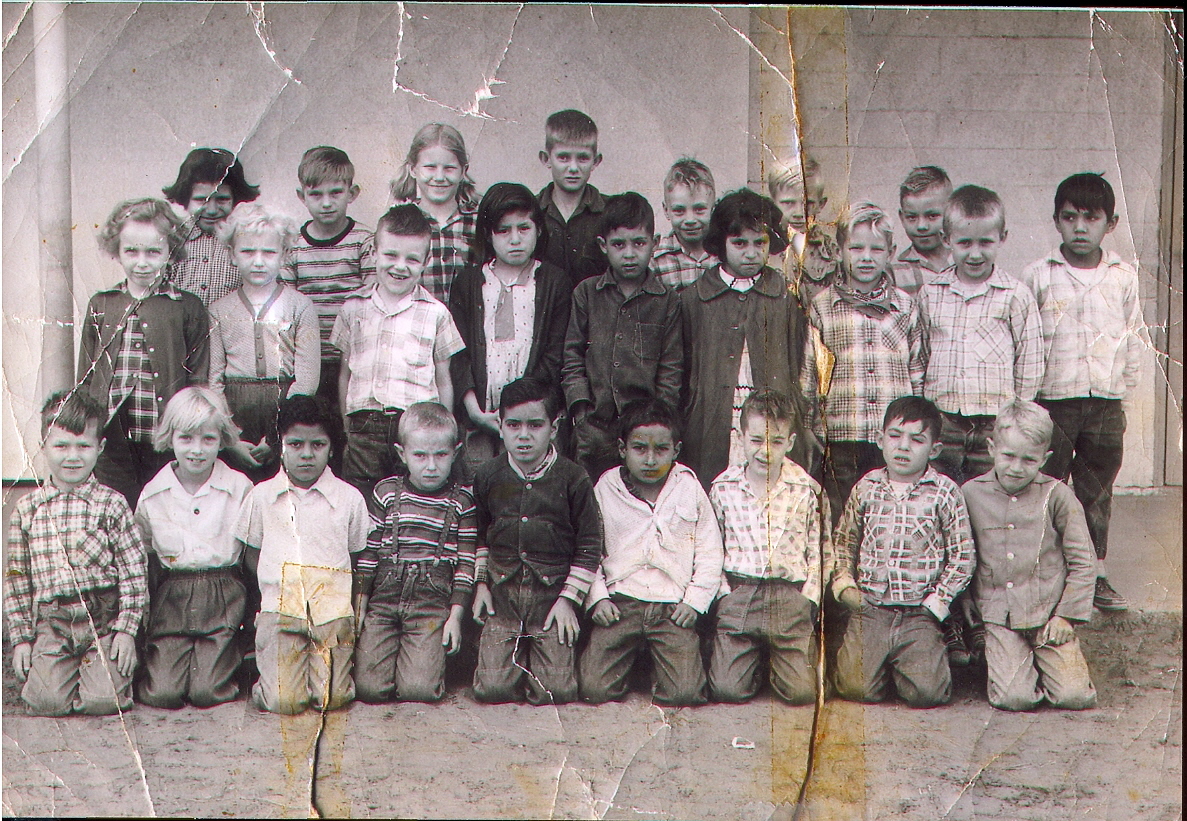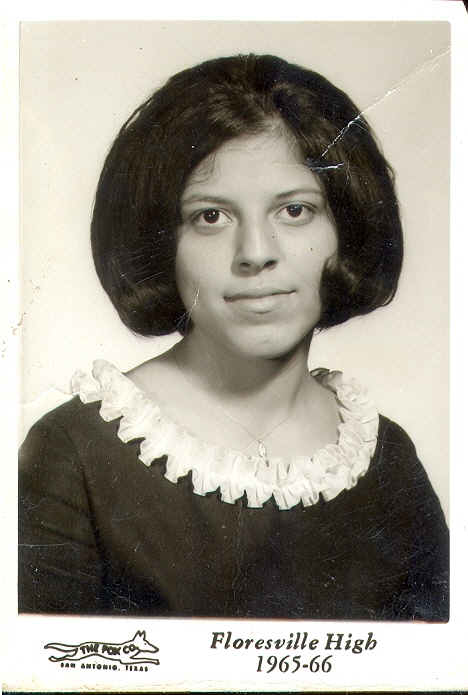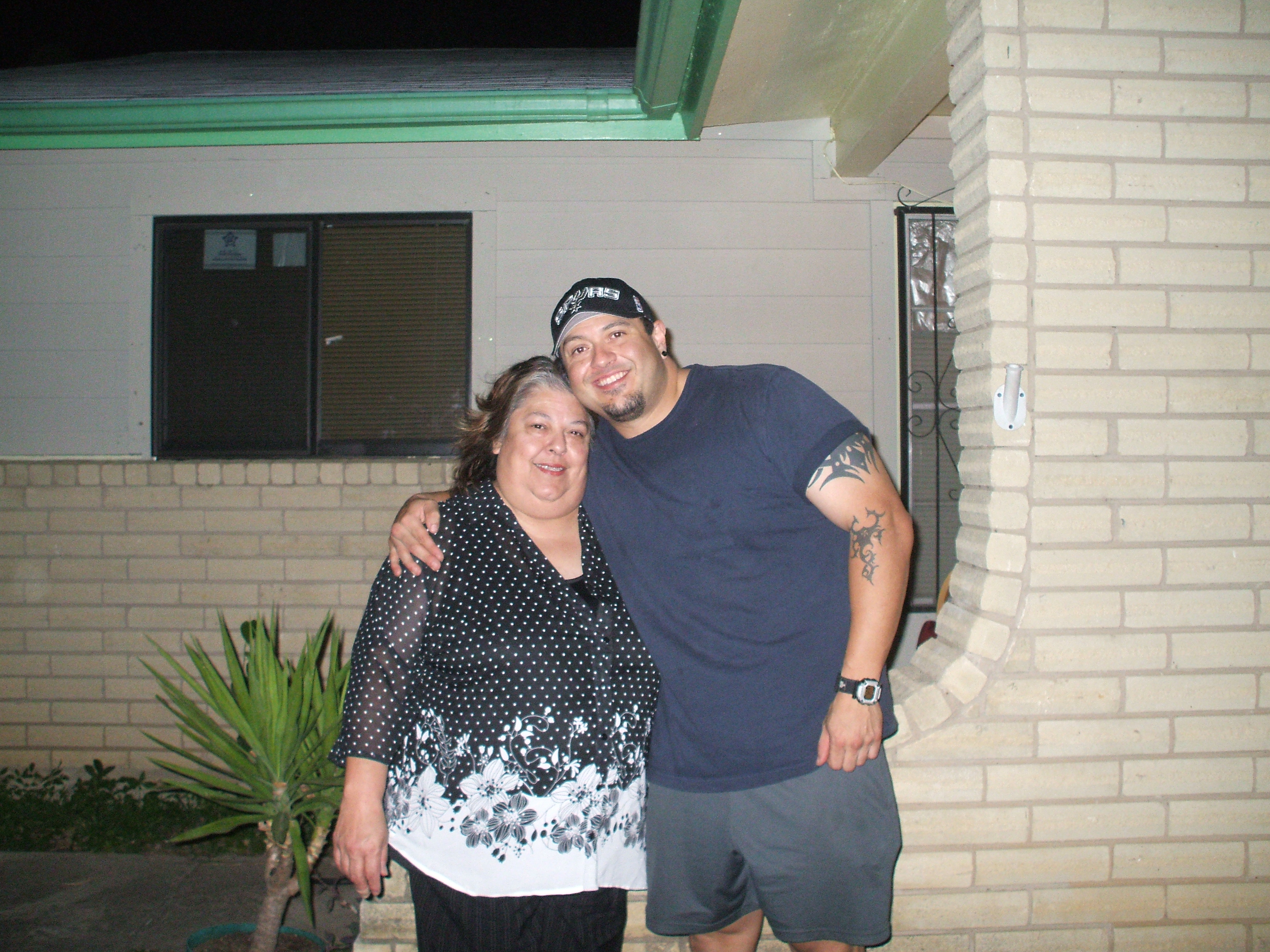Aurora Morales (nee Arocha)


What kind of grades did you make in school?
Mainly A's and B's
What was your favorite subject?
English… um, that I was out that much from school really I did good, and when I started school I did not know any English at all, none.

Why?
Because my parents did not speak any English only Spanish
About what age did you learn?
Right away when I started first grade, in fact the teacher had to tell my parents (chuckling) that's funny, that I needed to let the other students participate because I always wanted to read, I wanted to do everything, I was like a showboat I think because I knew it [the material]…but the others where real quiet so, hey.
And this was in first grade?
Uh-huh, first grade when we started doing the Jack and Jill went up the hill and all those little nursery rhymes
Was working more important than education at that time?
At that time, yes
What year was this?
Lets see, when did I start school…1954 all the way to the time that the most important thing was working money income to survive, it was a method of survival that's all that what was hard, because I started working at age of 10, in the fields ten hours a day, peanuts, watermelon, picking cotton you name it.
Where did ya'll travel to?
Minnesota, we would start here in…Corpus Christi, go to Tyler, we'd go to Taylor, Lubbock, Nebraska, Chicago.
How long would you stay?
I would say here locally it would be like a month in the little towns, but when we went like to Minnesota it was like a good 2 months, 2.5 months. We continued the process 'till I was a freshman. At that point we started working more local in the fields, they would knock down the trees and all the forest and then we pick up afterwards and burn the wood. There were no machinery like now, so we were the machines. Since I was the oldest, I had a lot of the burden to help mom and dad and ah, during the summer that's all we did, we were looking, I would go look for go work myself. I would go to the farms to the owners and say, "do you have any work to do" they'd say yes. We would work here and there 2 or 3 weeks. When I got older I would do that [job hunting]
While working in the fields what were your thoughts, what did you want to become as you were picking the cotton?
I always thought I was not going to do that, I was going to go to school and I was going to be a professional
A professional what?
Anything clerical, um. When I got to about the 10th grade I knew that I wanted to work for the government, that I knew. I set my [mind] and at Kelly. I knew that was one thing

How did you know about Kelly?
Because I heard in the news that it was a good job working with the government and it was Kelly at the time and your to take a test so I knew I was gonna, I knew more or less I was going to work there, that was my goal. It's weird because here I am at that age… but when I got to the 8th grade, my dad said I wasn't going to school anymore. Woman girls, didn't need to go to school after the 8th grade
Why?
Because back then they didn't believe women needed an education and my dad was from old school
What did he(her father) want you to do?
Stay home and start working in the fields, whatever it took and then I started crying because I wanted to go to school and I cried, and cried and my mom, she is the one, I have her to thank for that, they started fighting and bickering about that and I continued going to school because of her, so when…I graduated in May, … February I took the test for the government, I came downtown to the post office with my cousin and she took it too and that's how I got into [Kelly]…but if it would have been for mom and dad, I would have never worked here in the city, because it was only for floozies, driving that far.
Can you tell us about the algebra incident?
Yes. Um, there were only two classes for algebra and I had sighed up for it and me and another girl they told us to go to the principles office so we went to the principles office and he said 'ya'll wont need algebra, you'll never use it, I put ya'll in homemaking' at that time it was called homemaking and I remember that I myself said "homemaking", I didn't want homemaking, I just knew that I didn't want homemaking. But he said we were going to. My parents never went to talk to them, if it would have been my daughter, I would have been there, and "what do you mean my daughter's not going to use algebra." Or any course. But I got a complex. Up to this day because now I'm trying to get my Bachelors and that's what's holding me back, MATH 1314 COLLEGE ALGEBRA. It's hard, and I went to sign up and look what happened…2nd time so…

How far did you have to travel to your workplace [Kelly]?
32 miles to and back and I was a young lady, I was only 18, I was not married, I didn't know how to drive really. I knew how to drive the tractors, the trailers, but really drive, drive in town or anything, I remember the day started [work] dad had to drive me all the way over here and back, and believe it or not for the 1st week I would get home with my knees stiff because I was so afraid, I would be driving TENSE because I didn't know how to drive. So, but I did it and they wanted me to quit right away. They said no because they said my aunts and uncles were saying it was not good for a young lady to be traveling that [distance] every day back and forth
Do remember the route that you took to get to work?
I would take 536 to 181 all the way to military than from military I would hit zarzamora, zarzamora would hit Malone then Malone would hit Frio City rd and I would get to Kelly. It was a long route compared to what it is now, you know, but I used to do that everyday for 3 years, By 6:15 I had to be at work. So I would leave [from] early the house, it was dark
How many hours did you work per day?
Eight

What year was this?
1966, I was very, very lucky. I mean I just, it was during the Viet Nam era and, but I did past the test, so it was a gruesome all day test, believe it or not, of everything
Do you remember when JFK got shot?
Yes. I was in science class and uh, it came through the mic, and everybody was crying, but we were doing the science class and they said that he had just been shot and when he, when he died they announced it so you could here the kids crying from all the students, even though we were young, everybody felt it because he was doing good for the country, we knew that, so and we went through the process of MLK, seeing all those riots how they treated the people
How did the Civil Rights Act of 1964 affect you?
Um, I understood the importance of it, but at the same time I was …leery, I was afraid, because I felt that it was going to get worse for a lot of people, behind the scenes, because even though we had the act, a lot of people suffered because of that, they started disappearing so they say, you know like, because it was like behind the scenes they would start abusing
Like retribution?
Uh-huh, especially the black people, especially the black, Hispanics really didn't, I hate to say this but they didn't come out and fight
Why did Hispanics not step up?
They did join to help the black people, but Mexicans were always more afraid I think, intimidated, I think, not now, but back then. Because I was very outspoken and my mom dad would tell me not to ruffle feathers because it was not good because something's I couldn't understand like, in church, why do I have to be here? I didn't, I think I was confused…understand, to me, it didn't make sense…religion, and why not everybody was the same, why cant we, I think I was young and immature
What about when MLK got shot?
mmm, it was hard for me, but not as hard as for Kennedy, its funny because it just, I just , and I knew , I sensed it, that something, something was going to happen with him, all the time, and he was going forward, and he did a lot of hood not only for then, for right now. You know, so, I knew more or less that something was going to happen eventually to him and I thought it was going to be one of his own kind, because he had some people [that] were against him
Who?
I don't remember, but you know who was, what was it that guy, that one of them, the (Black) Panthers… he [MLK] didn't believe in violence , he believed that, and it was true, its like everything else, if you talk to someone in peace at the same level and respect, you gain more. Violence and you get violence and you get worse and that were the things they were clashing [about] and he want really upset with them, they were the ones that were upset with him because they felt he was not going fast enough
What are your thoughts & memories about Viet Nam?
Ohh…(sighs deeply) Viet Nam (pause)… lost a lot of my high school friends. Um, uh some of my friends married guys, couple of them that never made it back and one of them stayed with a little boy …that was a war that everyday you'd see the news, you would see they killed so many it was just like uh…crop fields of dead people, we weren't gaining anything… Viet Nam was hard for everybody and still, its hard for us because how many soldiers do we have right now that are all messed up mentally, physically. They came back like that. I have, like our compadres, they had a very hard marriage because when he came back they were already married, he's been messed up, his brain
What was your job title at Kelly?
I started as a warehouse worker
What did that entail?
It was working in the warehouse issuing out parts for the aircrafts, nuts and bolts, you name it. Whatever was required for the airplane. From warehouse worker I went to um, I was a clerk, clerk typist, then I became, from clerk typist I went to training for 18 months, took a test, and that was an apprentice, I became a what you call a warehouse inspector and good money, and then from there I went back as a secretary for the commander, then from the secretary of commander I went, and these are all promotion, inventory manager to program manager
When did you meet your husband?
I met him in 1967, right after I started
And when did ya'll get married?
1970
Can you talk about that award you told me about once?
Ok, the award that I received from the Air Force it's an award that's given to military and civilians that, their job is excellent and high performance and it's called the Dan Berkant Award and there's only few every year. They only select a few people from each A.L.C. (Air Logistic Command), Department of Defense under the Air Force and this event, what they do is, you're nominated, this is a nomination and your superiors nominate you and they sent it forward to a committee and its reviewed and they look at your performance, production whatever you did, uh, and then they decide who their going to select, they submit so many people from each A.L.C. and when they come back its, 'ok, this is the person'. I remember the day I got the call, this lady said, "Is this Aurora Morales?", she said this is so and so, she identified herself, "Congratulations, you are one of the recipients of the Dan Berkant Award, we're going to have a ceremony…" and she gave me the date and (chuckling) I said, "You gotta be kidding me," she says, "No", and later on I was so embarrassed, she says, "No, I'm not". I was just like…amazed, I was surprised you know because I had gotten that award it was great, very prestigious, I'm very proud of it. And I'm glad I got it that's one thing that I can take. From a little country girl that they didn't want me to go to school or do anything I succeeded in what I needed to do
How long did you work for the D.O.D?
33 years, retired in 2000
And now what do you do?
I work with Northwest Vista College , I'm a Student Success Specialist, advise students, I so transcripts, posting, evaluations, um a little of everything. I started there part-time after being retired for 18 months in 2002, I like it, I like what I do, I like seeing the students going there, they need help, I like… I didn't have the guidance, so [she helps them out]. I also work part-time at QVC order entry, I've been there, it'll be 14 years part-time, and I plan to retire from there too. And I think I'm gonna stay at N.W.V., I think with 10 years I can retire from there too
How many classes are you away from your Bachelors?
I think I have 27-21 hours to go. I can do it; I know I can do it. I do plan to get it, I think when I retire, I think I'll go to school so I can get, and they'll put it in my grave, so they say, "This lady earned it", The Countrified Lady
Is there anything else you would like to add to this interview?
Well, I'm very proud of you, I'm happy for you, you're a smart guy, my son and you can do it, and I know you will succeed at whatever you set your goals, you will succeed…anybody can, if I can, that I didn't have the backing from my parents especially, my dad, you can do it because you got out backing
And then we hugged...The End.

I learned many new things about my mother that I did not learn before. I think seeing how much my mother and I have in common, as far as sharing some of the same traits, is what I enjoyed the most. Finding out that my grandfather did not want my mom to got to school after the 8th grade was somewhat shocking. I never knew that my mother had the tenacious nature she has since she was a child, I thought it was something she had acquired. This project brought me and my mother much close together. I feel that I got to know her like a person gets to know someone at a bus stop or waiting in line somewhere. I love my mother with all my heart, but I got to see her not as just my mom, but more as a person. That is the main the main reason why I truly enjoyed this project. Although tedious, it was very fulfilling and enlightening.
U.S. Department of Defense The mission of DefenseLINK is to support the overall mission of the Department of Defense by providing official, timely and accurate information about defense policies, organizations, functions and operations. Also, DefenseLINK is the single, unified starting point for finding military information on-line..
Nothwest Vista College Northwest Vista College is creating opportunities for success. We are building a dynamic college with a vibrant community and invite you to share the experience with us. Located at 3535 N. Ellison Drive, next to SeaWorld of Texas, our campus combines a beautiful Hill Country setting with attractive modern facilities and student-oriented technology.
Kelly Air Force Base This link documents the history of Kelly Air Force Base. . 300 N. Washington St. Suite B-100 Alexandria, VA 22314 Phone: 703-548-2700 FAX: 703-548-2424.
Black Panther Party This website is dedicated to the history of the Black Panther Organization as well as its Mission Statement and overall philosophical veiws.
Civil Rights Act of 1964 This website is dedicated to all United States Historical Documents.
Cotton This website is dedicated to the cultivation, yeild, and cotton pest/disease. There is also an internal link to other global commodities, i.e., metals, energy, agriculturals .
Loire This website shows where Loire, Tx. is located in South Texas. It is sponored by Google Maps.
Photographs and/or documents on this website were provided by Aurora Morales